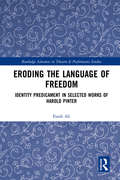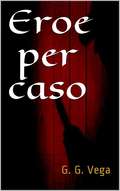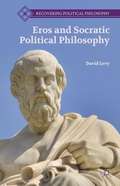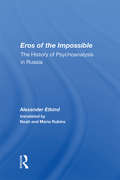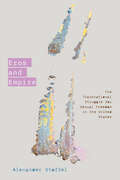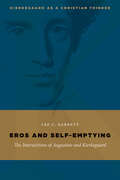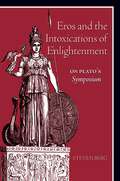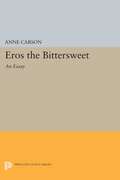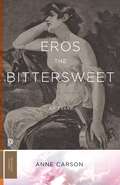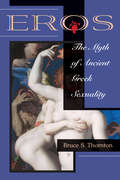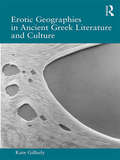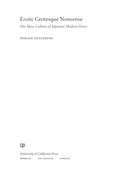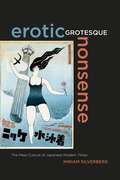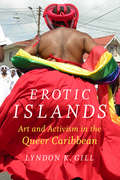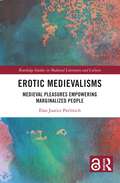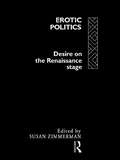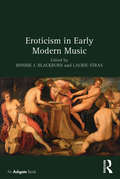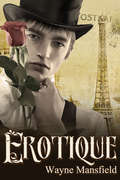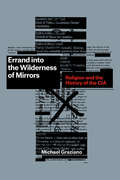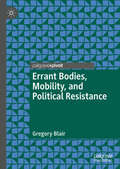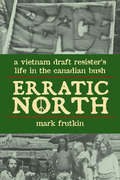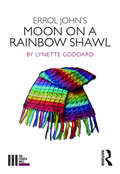- Table View
- List View
Eroding the Language of Freedom: Identity Predicament in Selected Works of Harold Pinter (Routledge Advances in Theatre & Performance Studies)
by Farah AliLet down by the uncertainties of memory, language, and their own family units, the characters in Harold Pinter’s plays endure persistent struggles to establish their own identities. Eroding the Language of Freedom re-examines how identity is shaped in these plays, arguing that the characters’ failure to function as active members of society speaks volumes to Pinter’s ideological preoccupation with society’s own inadequacies. Pinter described himself as addressing the state of the world through his plays, and in the linguistic games, emotional balancing acts, and recurring scenarios through which he put his characters, readers and audiences can see how he perceived that world.
Eroe per caso
by Guido Galeano Vega Stefano VazzolaUn libro basato su aree geografiche reali e identità reali che offre un insegnamento prezioso sull'importanza di determinati valori, che non devono essere dimenticati né disprezzati. Una storia gradevole di fantasia sull'esperienza eroica di un bambino di dodici anni chiamato Kaí in lingua guaraní, che in spagnolo significa Mono, scimmia. Sebbene la storia sia incentrata su una regione reale del Paraguay, in Sud America, e su identità reali (anche l'hotel-locanda Chololó è un bel posto per visitare e godersi la ricchezza della natura, dell'aria pura, della nobile vegetazione), si tratta di un racconto di fantasia che ho scritto perché apprezzo questa regione del mio Paese e la gente umile con la quale ho passato molti momenti. I bambini e i giovani citati sono miei amici.
Eros And Socratic Political Philosophy
by David LevyThis book offers a new account of Plato's view of eros, or romantic love, by asserting that Socrates is critical of eros because of its connection to irrational religious beliefs.
Eros Of The Impossible: The History Of Psychoanalysis In Russia
by Alexander EtkindMarxism was not the only Western idea to influence the course of Russian history. In the early decades of this century, psychoanalysis was one of the most important components of Russian intellectual life. Freud himself, writing in 1912, said that "in Russia, there seems to be a veritable epidemic of psychoanalysis." But until Alexander Etkind's Eros of the Impossible, the hidden history of Russian involvement in psychoanalysis has gone largely unnoticed and untold. The early twentieth century was a time when the craving of Russian intellectuals for world culture found a natural outlet in extended sojourns in the West, linking some of the most creative Russian personalities of the day with the best universities, salons, and clinics of Germany, Austria, France, and Switzerland. These ambassadors of the Russian intelligentsia were also Freud's patients, students, and collaborators. They exerted a powerful influence on the formative phase of psychoanalysis throughout Europe, and they carried their ideas back to a receptive Russian culture teeming with new ideas and full of hopes of self-transformation. Fascinated by the potential of psychoanalysis to remake the human personality in the socialist mold, Trotsky and a handful of other Russian leaders sponsored an early form of Soviet psychiatry. But, as the Revolution began to ossify into Stalinism, the early promise of a uniquely Russian approach to psychoanalysis was cut short. An early attempt to merge medicine and politics forms final chapters of Etkind's tale, the telling of which has been made possible by the undoing of the Soviet system. The effervescent Russian contribution to modern psychoanalysis has gone unrecognized too long, but Eros of the Impossible restores this fascinating story to its rightful place in history.
Eros and Empire: The Transnational Struggle for Sexual Freedom in the United States
by Alexander StoffelThe history of queer politics in the United States since 1968 is commonly narrated as either a progressive campaign for state recognition or as a subcultural rejection of prevailing gender norms. But these accounts miss the true scale of queer politics in the post-war era. By centering transnational relations, practices, and infrastructures in the history of sexual rebellion, Eros and Empire provides an alternative view of US-based struggles for sexual freedom. Alexander Stoffel analyzes three prominent US-based social movements—gay liberationism, Black lesbian feminism, and AIDS activism—to argue that they were fundamentally shaped by their transnational entanglements. Departing from popular domestic framings of these movements, Stoffel recasts the history of radical queer thought and action as a project of erotic worldmaking. This project mobilized queer affects of pleasure, desire, and eroticism in the fight for revolutionary transformation on a world scale. The transnational perceptions, activities, and consciousness of queer radicals, Stoffel argues, not only conditioned the trajectory of queer history, but also radicalized wider anti-imperialist, socialist, and abolitionist struggles past and present. In this ambitious and interdisciplinary work, Stoffel reconsiders the United States' revolutionary sexual past and creates new opportunities for the study of sexual formations in relation to questions of capital accumulation, empire, and resistance.
Eros and Self-Emptying: The Intersections of Augustine and Kierkegaard (Kierkegaard as a Christian Thinker)
by Lee C. BarrettA thought-provoking comparative take on two seminal thinkers in Christian historyIn this book -- the first volume in the Kierkegaard as a Christian Thinker series -- Lee Barrett offers a novel comparative interpretation of early church father Augustine and nineteenth-century philosopher-theologian Soren Kierkegaard.Though these two intellectual giants have been paired by historians of Western culture, the exact nature of their similarities and differences has never before been probed in detail. Barrett demonstrates that on many essential theological levels Augustine and Kierkegaard were more convergent than divergent. Most significantly, their parallels point to a distinctive understanding of the Christian life as a passion for self-giving love.Approaching Kierkegaard through the lens of Augustine, Barrett argues, enables the theme of desire for fulfillment in God to be seen as much more central to Kierkegaard's thought than previously imagined.
Eros and the Intoxications of Enlightenment: On Plato's Symposium (SUNY series in Ancient Greek Philosophy)
by Steven BergAn original analysis of one of Plato's most well-known and pivotal dialogues, this study is based upon the effort to think together the most manifest themes of the Symposium (the nature of eros and the relation between poetry and philosophy) with its less obvious but no less essential themes (the character of the city and the nature and limitations of sophistic enlightenment). Author Steven Berg offers an interpretation of this dialogue wherein all the speakers at the banquet—with the exception of Socrates—not only offer their views on the nature of love, but represent Athens and the Athenian enlightenment. Accordingly, Socrates' speech, taken in relation to the speeches that precede it, is shown to articulate the relation between Socrates and the Athenian enlightenment, to expose the limitations of that enlightenment, and therefore finally to bring to light the irresolvable tension between Socrates and his philosophy and the city of Athens even at her most enlightened.
Eros the Bittersweet: An Essay
by Anne CarsonThe insights presented in the volume are many and wide-ranging, recognizably in tune with the subtlest modern discussions of desire (such as triangulation. or loving what others love), yet offering new solutions to old problems, like the proper interpretation of Plato's Phaedrus. On the frequently discussed effect of literacy on Greek civilization, the book offers a fresh view: it was no accident that the poets who invented Eros were also the first readers and writers of the Western literate tradition.Originally published in 1989.The Princeton Legacy Library uses the latest print-on-demand technology to again make available previously out-of-print books from the distinguished backlist of Princeton University Press. These paperback editions preserve the original texts of these important books while presenting them in durable paperback editions. The goal of the Princeton Legacy Library is to vastly increase access to the rich scholarly heritage found in the thousands of books published by Princeton University Press since its founding in 1905.
Eros the Bittersweet: An Essay (Princeton Classics #130)
by Anne CarsonNamed one of the 100 best nonfiction books of all time by the Modern LibraryAnne Carson’s remarkable first book about the paradoxical nature of romantic loveSince it was first published, Eros the Bittersweet, Anne Carson’s lyrical meditation on love in ancient Greek literature and philosophy, has established itself as a favorite among an unusually broad audience, including classicists, essayists, poets, and general readers. Beginning with the poet Sappho’s invention of the word “bittersweet” to describe Eros, Carson’s original and beautifully written book is a wide-ranging reflection on the conflicted nature of romantic love, which is both “miserable” and “one of the greatest pleasures we have.”
Eros: The Myth Of Ancient Greek Sexuality
by Bruce S ThorntonEros: The Myth of Ancient Greek Sexuality is a controversial book that lays bare the meanings Greeks gave to sex. Contrary to the romantic idealization of sex dominating our culture, the Greeks saw eros as a powerful force of nature, potentially dangerous, and in need of control by society: Eros the Destroyer, not Cupid the Insipid, fired the Greek imagination.The destructiveness of eros can be seen in Greek imagery and metaphor, and in the Greeks' attitudes toward women and homosexuals. Images of love as fire, disease, storms, insanity, and violence?Top 40 song clich�for us?locate eros among the unpredictable and deadly forces of nature. The beautiful Aphrodite embodies the alluring danger of sex, while femmes fatales like Pandora and Helen represent the risky charms of female sexuality. And homosexuality typifies for the Greeks the frightening power of an indiscriminate appetite that threatens the stability of culture itself.In Eros: The Myth of Ancient Greek Sexuality, Bruce Thornton offers a uniquely sweeping and comprehensive account of ancient sexuality free of currently fashionable theoretical jargon and pretentions. In its conclusions the book challenges the distortions of much recent scholarship on Greek sexuality. And throughout it links the wary attitudes of the Greeks to our present-day concerns about love, sex, and family. What we see, finally, are the origins of some of our own views as well as a vision of sexuality that is perhaps more honest and mature than our own dangerous illusions.
Erotic Geographies in Ancient Greek Literature and Culture
by Kate GilhulyErotic Geographies in Ancient Greek Literature and Culture addresses the following question: how does a place "get a reputation?" The Athenians associated sexual behaviors with particular places and their inhabitants, and this book decodes the meaning of the sexualization of place and traces the repercussions of these projections. Focusing on Corinth, Sparta, and Lesbos, each section starts from the fact that there were comic joke words that made a verb out of a place name to communicate a sexual slur. Corinth was thought of as a hotbed of prostitution; Sparta was perceived as a hyper-masculine culture that made femininity a problem; Lesbos had varying historically determined connotations, but was always associated with uninhibited and adventurous sexuality. The cultural beliefs encoded in these sexualized stereotypes are unpacked. These findings are then applied to close readings, ultimately demonstrating how sensitivity to the erotics of place enables new interpretations of well-known texts. In the process of moving from individual word to culture to text, Erotic Geographies recovers a complex mode of identity construction illuminating the workings of the Athenian imaginary as well as the role of discourse in shaping subjectivity. Gilhuly brings together a deep engagement with the robust scholarly literature on sex and gender in Classics with the growing interest in cultural geography in a way that has never been done before.
Erotic Grotesque Nonsense
by Miriam SilverbergThis history of Japanese mass culture during the decades preceding Pearl Harbor argues that the new gestures, relationship, and humor of ero-guro-nansensu (erotic grotesque nonsense) expressed a self-consciously modern ethos that challenged state ideology and expansionism. Miriam Silverberg uses sources such as movie magazines, ethnographies of the homeless, and the most famous photographs from this era to capture the spirit, textures, and language of a time when the media reached all classes, connecting the rural social order to urban mores. Employing the concept of montage as a metaphor that informed the organization of Japanese mass culture during the 1920s and 1930s, Silverberg challenges the erasure of Japanese colonialism and its legacies. She evokes vivid images from daily life during the 1920s and 1930s, including details about food, housing, fashion, modes of popular entertainment, and attitudes toward sexuality. Her innovative study demonstrates how new public spaces, new relationships within the family, and an ironic sensibility expressed the attitude of Japanese consumers who identified with the modern as providing a cosmopolitan break from tradition at the same time that they mobilized for war.
Erotic Grotesque Nonsense: The Mass Culture of Japanese Modern Times
by Miriam SilverbergThis history of Japanese mass culture during the decades preceding Pearl Harbor argues that the new gestures, relationship, and humor erotic grotesque nonsense expressed a self-consciously modern ethos that challenged state ideology and expansionism.
Erotic Islands: Art and Activism in the Queer Caribbean
by Lyndon K. GillIn Erotic Islands, Lyndon K. Gill maps a long queer presence at a crossroads of the Caribbean. This transdisciplinary book foregrounds the queer histories of Carnival, calypso, and HIV/AIDS in the Republic of Trinidad and Tobago. At its heart is an extension of Audre Lorde's use of the erotic as theory and methodology. Gill turns to lesbian/gay artistry and activism to insist on eros as an intertwined political-sensual-spiritual lens through which to see self and society more clearly. This analysis juxtaposes revered musician Calypso Rose, renowned mas man Peter Minshall, and resilient HIV/AIDS organization Friends For Life. Erotic Islands traverses black studies, queer studies, and anthropology toward an emergent black queer diaspora studies.
Erotic Medievalisms: Medieval Pleasures Empowering Marginalized People
by Elan Justice PavlinichErotic Medievalisms exposes modern apparatuses of oppression, reclaims histories for marginalized people, and promotes more inclusive representations in popular culture. Modern representations of the Middle Ages—including Santiago García and David Rubín’s graphic novel, Beowulf; Lil Nas X’s music video for "Montero (Call Me by Your Name);" Patience Agbabi’s retelling of Chaucer’s The Miller’s Tale, entitled "The Kiss;" and some BDSM (bondage and discipline, dominance and submission, sadism and masochism) practices—challenge pervasive power structures that privilege heterosexual male dominance commonly associated with medieval origins in popular culture. This comparative study between medieval and modern texts foregrounds the sexual gratification of people who are typically excluded from representations of the Middle Ages, specifically women, people of color, and LGBTQ+ individuals. Erotic displays of marginalized people in medieval contexts disrupt prevalent forms of oppression rooted in institutions that censor human experiences and direct sexual desires toward social justice.
Erotic Politics: The Dynamics of Desire in the Renaissance Theatre
by Susan ZimmermanIdentifying the stage as a primary site for erotic display, these essays take eroticism in Renaissance culture as a paradigm for issues of sexuality and identity in early modern culture. Contributors examine how the Renaissance stage functioned as a decoder for erotic experience, both reinforcing and subverting expected sexual behaviour. They argue that the dynamics of theatrical eroticism served to deconstruct gender definitions, leaving conventional categories of sexuality blurred, confused - or absent. In seeking to reposition the conventions and subversions of gender and desire in terms of one another, these essays open up an attractive and distinctive perspective in cultural debate.
Eroticism in Early Modern Music
by Laurie Stras Bonnie BlackburnEroticism in Early Modern Music contributes to a small but significant literature on music, sexuality, and sex in sixteenth- and seventeenth-century Europe. Its chapters have grown from a long dialogue between a group of scholars, who employ a variety of different approaches to the repertoire: musical and visual analysis; archival and cultural history; gender studies; philology; and performance. By confronting musical, literary, and visual sources with historically situated analyses, the book shows how erotic life and sensibilities were encoded in musical works. Eroticism in Early Modern Music will be of value to scholars and students of early modern European history and culture, and more widely to a readership interested in the history of eroticism and sexuality.
Erotique
by Wayne MansfieldLaurence and Eduardo have been lovers for ten wonderful years, but in the past few months Eduardo has become distant. Still madly in love with his Brazilian hunk, Laurence tries everything he can think of to win Eduardo back. When he catches Eduardo being unfaithful with one of the young servants, Laurence’s world is turned upside down. An argument ensues and Eduardo disappears during the night.On his own for the first time in his life, Laurence decides to escape his memories of Eduardo by visiting Paris indefinitely. He stays at the new, opulent Hotel Regina where he meets Brenton, a fellow Brit. They visit the Moulin Rouge and afterwards, Brenton takes him to a club in the backstreets of Montmatre. Le Cul Noir is a men’s club where Laurence discovers he hasn’t been as outrageous as he previously thought.He grows to care for Brenton, but he’s surprised to find himself thinking more and more about Eduardo. He knows he can’t have them both, but does he try to forget all about the love of his life and stay in Paris? Or does he have to find the courage to say goodbye to Brenton and go in search of Eduardo -- a man who may be lost to him forever?
Erpressung (Anns Krieg #3)
by Hannah HoweWährend ihr Ehemann Emrys immer noch vermisst wird, muss sich Ann Morgan der Aussicht stellen, ihren ersten Hochzeitstag und Weihnachten allein zu verbringen. Aber ein Anruf von Alistair Blythe, einem jungen Mann, mit dem sie vor ihrer Heirat mit Emrys kurz ausgegangen ist, bringt sie auf eine Spur, die zu Mord, Begegnungen mit Schwarzhändlern und lebensbedrohlichen Situationen führt. Mit der Hilfe von Spion Charles Montagu und Detective Inspector Max Deveraux enthüllt Ann ein großes Geheimnis des Kriegs. Und während der Schnee an Weihnachten fällt, erhält sie ein Geschenk, das sie nie vergessen wird.
Errand into the Wilderness of Mirrors: Religion and the History of the CIA
by Michael GrazianoMichael Graziano’s intriguing book fuses two landmark titles in American history: Perry Miller’s Errand into the Wilderness (1956), about the religious worldview of the early Massachusetts colonists, and David Martin’s Wilderness of Mirrors (1980), about the dangers and delusions inherent to the Central Intelligence Agency. Fittingly, Errand into the Wilderness of Mirrors investigates the dangers and delusions that ensued from the religious worldview of the early molders of the Central Intelligence Agency. Graziano argues that the religious approach to intelligence by key OSS and CIA figures like “Wild” Bill Donovan and Edward Lansdale was an essential, and overlooked, factor in establishing the agency’s concerns, methods, and understandings of the world. In a practical sense, this was because the Roman Catholic Church already had global networks of people and safe places that American agents could use to their advantage. But more tellingly, Graziano shows, American intelligence officers were overly inclined to view powerful religions and religious figures through the frameworks of Catholicism. As Graziano makes clear, these misconceptions often led to tragedy and disaster on an international scale. By braiding the development of the modern intelligence agency with the story of postwar American religion, Errand into the Wilderness of Mirrors delivers a provocative new look at a secret driver of one of the major engines of American power.
Errand into the Wilderness of Mirrors: Religion and the History of the CIA
by Michael GrazianoMichael Graziano’s intriguing book fuses two landmark titles in American history: Perry Miller’s Errand into the Wilderness (1956), about the religious worldview of the early Massachusetts colonists, and David Martin’s Wilderness of Mirrors (1980), about the dangers and delusions inherent to the Central Intelligence Agency. Fittingly, Errand into the Wilderness of Mirrors investigates the dangers and delusions that ensued from the religious worldview of the early molders of the Central Intelligence Agency. Graziano argues that the religious approach to intelligence by key OSS and CIA figures like “Wild” Bill Donovan and Edward Lansdale was an essential, and overlooked, factor in establishing the agency’s concerns, methods, and understandings of the world. In a practical sense, this was because the Roman Catholic Church already had global networks of people and safe places that American agents could use to their advantage. But more tellingly, Graziano shows, American intelligence officers were overly inclined to view powerful religions and religious figures through the frameworks of Catholicism. As Graziano makes clear, these misconceptions often led to tragedy and disaster on an international scale. By braiding the development of the modern intelligence agency with the story of postwar American religion, Errand into the Wilderness of Mirrors delivers a provocative new look at a secret driver of one of the major engines of American power.
Errant Bodies, Mobility, and Political Resistance
by Gregory BlairThis book explores a type of wandering referred to as “errant bodies.” This form of wandering is intentional, without specific destination, and operates as a means of resistance against hegemonic forms of power and cultural prescriptions. Beginning with an examination of the character and particulars of being an errant body, the book investigates historical errant bodies including Ancient Greek Cynics, Punks, Baudelaire, Situationists, Earhart, Kerouac, Fuller, Baudrillard, Hamish Fulton, and Keri Smith. Being an errant body means stepping to the side of dominant culture, creating a potential means of political resistance in the technologically driven twenty-first century.
Erratic North: A Vietnam Draft Resister's Life in the Canadian Bush
by Mark FrutkinIn geology an erratic is a "boulder or rock formation transported some distance from its original source, as by a glacier." In award-winning novelist Mark Frutkin’s case, his movement from his native Cleveland. Ohio, was instigated by his wish to protest and resist the U.S. military draft during the Vietnam War, and his destination was Canada.An estimated 50,000 to 100,000 American Vietnam War draft resisters sought sanctuary in Canada. Many of these men stayed, became Canadian citizens, and have made significant contributions to the country, including writers such as William Gibson, George Fetherling, Keith Maillard, and Jay Scott; musicians Jesse Winchester and Jim Byrnes; children’s performer Eric Nagler; and radio personality Andy Barrie.Although this first nonfiction work by Mark Frutkin looks back at the circumstances and culture of the late 1960s and early 1970s that prompted the author to relocate to Canada, Erratic Northis about many other things. It’s also a lyrical meditation about "returning to nature" in the bush country of Quebec and an account of the crucible that forged one writer. Tying everything together, though, is the overarching theme of the book: a contemplation of humanity’s embrace of war and violence and the countervailing impulse to resist that embrace, specifically as seen in the experience of Frutkin himself; his grandfather Simon, who escaped Tsarist Russia and its military in the 1890s; and Louis Drouin, the Quebec farmer Frutkin bought his original farm from and who resisted conscription in World War II.
Errol John's Moon on a Rainbow Shawl (The Fourth Wall)
by Lynette GoddardErrol John wrote Moon on a Rainbow Shawl (1958) after becoming disillusioned about the lack of good roles for black actors on the British theatre scene. While this situation has only slightly improved since, his response has become the most revived black play in Britain, from its original production at the Royal Court in 1958, to the National Theatre in 2012. It depicts the lives of a black community living in poverty in a shared tenement yard in Port of Spain, Trinidad, in the mid-1940s, showing how each of the characters carries dreams of escaping to create better lives for themselves and their families. Lynette Goddard focuses on how the play articulates the narratives of migration that prompted many Caribbean people to uproot from their homes on the islands and move to the England in the post-war era. For some of them, these dreams of a new life became a reality, but they were experienced differently across genders and generations.
